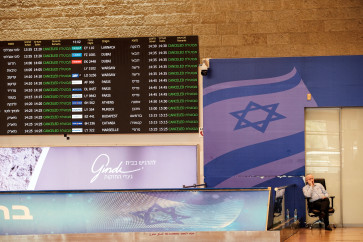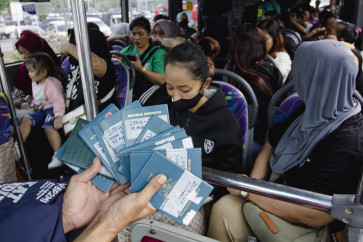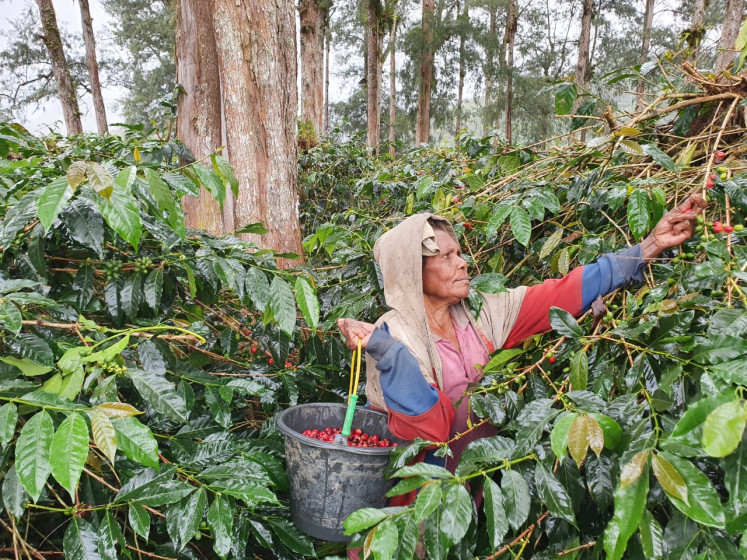Popular Reads
Top Results
Can't find what you're looking for?
View all search resultsPopular Reads
Top Results
Can't find what you're looking for?
View all search resultsCSIS food resiliency seminar: What can we learn?
Food prices are an anomaly in Indonesia. While global food prices are declining, in Indonesia they are climbing.
Change text size
Gift Premium Articles
to Anyone
 The Centre for Strategic and International Studies (CSIS) recently held a public seminar entitled ‘Increasing Food Resiliency in Indonesia: Issues, Challenges & the Role of International Trade’. (thejakartapost.com/Devina Heriyanto)
The Centre for Strategic and International Studies (CSIS) recently held a public seminar entitled ‘Increasing Food Resiliency in Indonesia: Issues, Challenges & the Role of International Trade’. (thejakartapost.com/Devina Heriyanto)
T
he Centre for Strategic and International Studies (CSIS) recently held a public seminar entitled ‘Increasing Food Resiliency in Indonesia: Issues, Challenges & the Role of International Trade’.
The seminar invited many stakeholders as speakers, ranging from Gardjita Budi from the Food Resilience Agency, Denni Purbasari from the Office of Presidential Staff, Maria Monica from the World Bank, Indrasari Wisnu Wardhana from the Trade Ministry, Rachmad Hidayat from the Indonesian Food and Beverages Association ( GAPMMI ) and Yose Rizal, the director of the CSIS economics department.
In the beginning, Raymond Atje, a senior fellow at CSIS and also a moderator, stated that there were several questions to be addressed regarding food resiliency. It was not only about the possibility, he said: “Is it sustainable? At what cost?”
Gardjita outlined the strategic environment of Indonesian food resiliency. Food resilience is not only about supply, price and demand. There are also other factors such as land and water availability, population growth, climate change, and social and economic conditions.
Other than availability, the nutrition in food should also be considered. There is a tendency to fulfill daily caloric needs by eating high-carbohydrate food, as opposed to the protein which is necessary for growth. As a result, 37.2 percent of Indonesian children are stunted.
Denni Purbasari stated that the Office of Presidential Staff had listed several priority programs to increase food resiliency, namely: reform of the rice for the poor (raskin) program, a change in diet, improvement of fertilizer, increasing irrigation, knowledge-based agriculture, rice price mechanisms, import policy and better statistics.
Food prices are an anomaly in Indonesia. While global food prices are declining, in Indonesia they are climbing. The prices from the producers (farmers) is 58 percent higher than those of Thailand due to higher production cost. Indonesia’s rice retail price is 78 percent greater than in Vietnam. There is a big gap between producer price and retail price.
According to Maria Monica from the World Bank, reform of the raskin program and market operations are needed as neither are currently effective. Raskin is more efficient than market operations at stabilizing the price, said Monica, “Raskin is not a mechanism to stabilize price but a form of social assistance.”
Furthermore, Monica cited “the failure of government policy” for the high food price. She argued that the spike back in March 2015 should have been predicted based on data form the State Logistics Agency (Bulog).
The processed food industry also contributes to food resiliency. Rachmad Hidayat from GAPMMI said processed food majorly contributed to food inflation. However, there was a concern in the industry that there were too many regulations that might not be beneficial for business. Rachmad highlighted the halal guarantee laws, tax on agricultural products, plastic waste management regulations and a planned levy on plastic packaging.
GAPMMI also feels restricted by import policy set by the government. Indrasari Wisnu Wardhana from the Trade Ministry was also present at the seminar, explaining Indonesian import policy, which heavily regulates when companies can import food.
Rachmad cited an incident during last year’s Ramadan where some companies stopped production due to the unavailability of industry-grade salt. “The food industry employs four million people. The multiplier effect is four times, meaning that we employ 20 million people. There are also more than one million small retailers. If we cannot do business properly, where will these people go?” asked Rachmad.
Echoing Rachmad, economic expert Yose Rizal stated that the existing trade policies “were very restrictive and sometimes politically driven”. Yose argued that there was a paradigm in Indonesia that associated a lack of imports to success in food resiliency.
The main reasons often used by anti-imports group are fluctuations in the global food market and protection of farmers. Both are invalid, according to Yose. The price trend in global food market is more stable than Indonesia, and limiting imports often increases the gap between producer price and retail price, not benefiting farmers, he said.
---------------
We are looking for information, opinions, and in-depth analysis from experts or scholars in a variety of fields. We choose articles based on facts or opinions about general news, as well as quality analysis and commentary about Indonesia or international events. Send your piece to community@jakpost.com.









